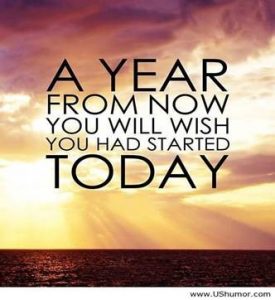Finding Confidence In Our Lives
 American philosopher and psychologist William James once said that, “Most people live in a restricted circle of potential.” Although he made this observation over a century ago, it still holds true today. When it comes to fulfilling our potential, it’s often not a lack of resources, opportunity or intelligence, but a lack of self-confidence. We often become our own worst enemy when we continually doubt ourselves and listen to the self-defeating voices in our head.
American philosopher and psychologist William James once said that, “Most people live in a restricted circle of potential.” Although he made this observation over a century ago, it still holds true today. When it comes to fulfilling our potential, it’s often not a lack of resources, opportunity or intelligence, but a lack of self-confidence. We often become our own worst enemy when we continually doubt ourselves and listen to the self-defeating voices in our head.
Many of us mistakenly believe that confidence is something certain lucky people are born with and the rest of us are just futilely trying to find it. But confidence is simply the outcomes of our own thoughts and actions. It’s the belief in our ability to succeed at a task. For example:
- Our belief that we can give a speech in front of an audience
- Our belief that we can exit an unhealthy relationship and find one more fulfilling
- Our belief that we can change career paths or start a business
You get the picture. Our brain tells us a lot – some of it’s true, but a lot of it isn’t. It’s those untrue, self-defeating thoughts that hold us back from taking the steps necessary for meaningful change. On the flipside, self-confidence gives us the courage to break out of our comfort zone and face fears head-on.
The Benefits of Self-Confidence
There’s no doubt about it – having confidence in ourselves feels good! However, there are many other benefits that confidence brings to our lives. Here’s a look at a few:
- More resilience: Resilience is the ability to cope with and recover from setbacks. Higher levels of self-confidence enhance your resiliency and help you bounce back from life’s challenges.
- Healthier relationships: When you have confidence in yourself, it helps you better understand and care for others. It also helps you identify relationships that aren’t healthy and gives you the strength to move on.
- Better performance: Many of us waste our time worrying that we’re not good enough. Self-confidence doesn’t mean you’re not going to make mistakes or even fail, but it will help you devote your energy to what matters instead of self-deprecating thoughts. And that translates to better performance no matter what task is in front of you.
- Willingness to try new things: Whether you want to sign up for a class, learn a new skill or tackle that half marathon, self-confidence makes you more willing to try new things and put yourself out there.
We can all relate to the ebb and flow of confidence throughout our lives. Even if you’ve spent years doubting your abilities and feeling like you can’t take the steps to break out of self-defeating beliefs, it’s never too late to change course. Working with a coach, like Leah M Joppy and Associates, can put you on the right path towards greater self-confidence. You’ll learn why you’re stuck in a pattern of negative thoughts, how you can break the cycle, tools you can use to bring lasting change and so much more.
Contact us today at 301-670-0051 or email leah@lmja.com and let’s squash those negative thoughts and enhance your life through strengthened confidence!
The Role Of Confidence In The Workplace
 According to a survey by the job site Indeed, 94% of employees said that confidence is vital to complete daily tasks at work and believe it’s a major contributor to overall career growth. In addition, 98% of those surveyed said they perform better when they feel more confident. These numbers aren’t exactly surprising, but they do highlight the importance that self-confidence plays in the workplace. As we mentioned in our last article, the good news is that confidence isn’t something you’re born with, but something we can all build, practice and reinforce!
According to a survey by the job site Indeed, 94% of employees said that confidence is vital to complete daily tasks at work and believe it’s a major contributor to overall career growth. In addition, 98% of those surveyed said they perform better when they feel more confident. These numbers aren’t exactly surprising, but they do highlight the importance that self-confidence plays in the workplace. As we mentioned in our last article, the good news is that confidence isn’t something you’re born with, but something we can all build, practice and reinforce!
We all want to feel confident at work, but often, it feels like there are forces beyond our control. Maybe you’re new to a job or career path and are terrified of making mistakes. Perhaps you feel like you’re underqualified in a leadership role and don’t have what it takes to build a successful team. Or maybe you’ve always been really hard on yourself and constantly question whether you have what it takes to succeed. Whatever the case, these self-defeating thoughts aren’t doing you any favors and can hold you back from promotions, management roles and more. Self-confidence in the workplace has so many positives, including better communication skills, increased ability to handle feedback and conflict, greater happiness and a decrease in comparing yourself to others.
So, what does confidence in the workplace look like? Not everyone expresses self-confidence in the same way, but there are some common traits that confident people possess. Here’s a few:
- They don’t seek validation from others
- They don’t worry about things outside of their control
- They aren’t afraid to ask for help
- They’re decisive and assertive
- They recognize when they make a mistake
- Their verbal cues match their non-verbal cues (they’re genuine and sincere!)
- They appear confident through their eye contact, dress, body language, etc.
How many do you see in yourself?
Think of the times you’ve let self-doubt seep into your mind. Remember the worry, the sleepless nights, the doubts that you really deserve that promotion you’ve been working for. If you feel like your lack of self-confidence is holding you back in your career, Leah M Joppy and Associates is ready to help you squash those self-defeating patterns. We’ll work together to look at your goals and aspirations, where self-confidence plays a role, what’s holding you back and tools that you can use to make positive changes.
Call us at 301-670-0051 or email leah@lmja.com and let’s start the journey towards greater self-confidence together.
Ideas for Improving Psychological Safety
 Imagine a work environment where every team member feels comfortable sharing their opinions and ideas.
Imagine a work environment where every team member feels comfortable sharing their opinions and ideas.
- An environment where people feel like they can learn from their mistakes and not humiliated.
- An environment where disagreements and open discussions are encouraged and not seen as a threat.
Perhaps you already work in an office like this and you probably feel grateful for it! However, if you’re like many, it could feel like a dream that will never come true. That’s because many organizations have difficulty developing and maintaining a strong sense of psychological safety for their team members. As we discussed in our last article, psychological safety is about being able to act and engage in a team without fear of negative consequences. It’s one of the strongest proven predictors of team effectiveness.
It takes great leadership and management to create psychological safety. But if you feel like it’s lacking in your organization, what are a few first steps you can take to improve it? Here are some ideas to get started:
- Practice accountability and lead by example: Leaders set the tone for an organization and are responsible for the psychological safety of the workplace. Leaders should be approachable, be open to opinions that differ from their own and be willing to acknowledge their own mistakes (just to name a few).
- Enhance communication skills: For example, ask team members directly for their thoughts and opinions. Encourage people to share by asking questions. Actively ask quieter individuals for their input. Also, practice active listening by leaving your phone on your desk during meetings and improving eye contact.
- Hone conflict resolution skills: No one likes to deal with conflict, but when you’re leading a team, it’s inevitable. If a team member humiliates or undermines others or prevents team members from speaking up, leaders have to be ready to intervene. Just one or two negative people can really put a damper on overall company culture.
- Foster open conversations with team members: It’s vital to pay attention to how your team operates. Do some people dominate during meetings? Are some more quiet and seem reluctant to participate? Make an effort to enable equal speaking time for everyone. A calm environment and perhaps some ice breakers are just a few ways to put everyone at ease. Team outings or even virtual hangouts can also provide an opportunity for team members to let their guard down and get to know each other better.
Saying you encourage your team to speak up and be candid is one thing, but creating a culture of trust is another. It takes care, consistency and a commitment to learning new behaviors, but the payoff is worth it! Fortunately, you don’t have to do it alone. Leah M. Joppy and Associates is ready to help with fresh ideas and strategies to help you increase psychological safety within your organization. Call us at 301-670-0051 or email us at leah@lmja.com and let’s start 2023 off on a productive note!
Psychological Meaningfulness
 Most of us spend the majority of our week at the office, yet how many of us find our job to be meaningful? It can feel like a pipe dream to find work that makes us feel fulfilled and motivated. And the numbers back this up: according to a study by Bates College and Gallup, over 80% of college-educated Americans aspire to meaningful work, yet less than 50% actually attain it. This isn’t good news for organizations, as a lack of employee engagement and perceived meaninglessness leads to decreased productivity, lower morale and greater turnover
Most of us spend the majority of our week at the office, yet how many of us find our job to be meaningful? It can feel like a pipe dream to find work that makes us feel fulfilled and motivated. And the numbers back this up: according to a study by Bates College and Gallup, over 80% of college-educated Americans aspire to meaningful work, yet less than 50% actually attain it. This isn’t good news for organizations, as a lack of employee engagement and perceived meaninglessness leads to decreased productivity, lower morale and greater turnover
I just recently completed a certification from Cornell University on Diversity, Equity and Inclusion. The course, taught by Professor Nishii, takes a deep dive into the issue of employee engagement and it’s three components. We examined psychological availability last month and this month we’re taking a look at the second component: psychological meaningfulness.
What Is Psychological Meaningfulness?
What do we mean by the term “psychological meaningfulness”? Organizational psychologist William Kahn, author of the 1990 study “Physical Conditions of Personal Engagement and Disengagement at Work”, defined it as “employees perceiving their role/task as meaningful, both to the organization and within the context of wider society, to justify their “full self” being deployed.” Team members feel motivated within their positions due to challenge, opportunities for autonomy and strong goals. They feel like they’re a part of something larger than themselves.
What Psychological Meaningfulness Looks Like – and Steps to Avoid
There is no one-size-fits-all approach to meaningful work. It differs from person to person and often changes as people age, go through periods of personal change and have various life experiences. But we can agree that once a sense of meaningfulness is found, it brings about a greater sense of pride and achievement, a feeling of fulfillment and a satisfaction in finding work that is absorbing and interesting. And while there’s no magic formula for creating meaningful positions, there are definite steps that organizations don’t want to take. Here are 6 of the most common mistakes:
- Failing to recognize and appreciate team members’ contributions
- Creating a disconnect between organization and personal values
- Treating team members unfairly
- Overriding team members’ judgment and making them feel disempowered
- Creating a disconnect between team members
- Putting team members in situations where they feel unsafe
Most organizations don’t know where to begin when it comes to helping their employees find more meaning in their positions and increase overall engagement. The typical “office perks” are often surface level and don’t delve into the root issues. That’s where Leah M Joppy and Associates can help. A fresh approach and perspective, combined with experience tackling all different types of employee disengagement issues is just what you need to start next year off on a positive note! Call us at 301-670-0051 or email us at leah@lmja.com today.
A Word For An Unsettled Environment
 Chances are, you’ve probably heard or read the acronym ‘VUCA’ (Volatility, Uncertainty, Complexity, Ambiguity) thrown around a time or two. It’s one of those buzz-worthy terms to describe the unsettled environment organizations have to deal with on a daily basis. And nothing has brought out VUCA more than the past few years, as organizations have dealt with unprecedented changes in day-to-day operations and had to pivot in unexpected ways.
Chances are, you’ve probably heard or read the acronym ‘VUCA’ (Volatility, Uncertainty, Complexity, Ambiguity) thrown around a time or two. It’s one of those buzz-worthy terms to describe the unsettled environment organizations have to deal with on a daily basis. And nothing has brought out VUCA more than the past few years, as organizations have dealt with unprecedented changes in day-to-day operations and had to pivot in unexpected ways.
The acronym ‘VUCA’ was first used in 1987 by the U.S Army War College to describe the unfortunate situation after the Cold War. The term later found its way into the business world and outlines four distinct challenges that leaders face:
Volatility: Challenges are unstable and unexpected. The duration of these challenges is unknown.
Uncertainty: The future is unpredictable. It’s nearly impossible to anticipate events and how they’ll unfold.
Complexity: Information is overwhelming and choosing a single right path is almost impossible. Challenges and their repercussions are more complex and harder to understand.
Ambiguity: Situations are vague and difficult to interpret.
In short, we’re living in a world that’s constantly changing and these changes, whether big or small, are happening faster and faster and in more unpredictable ways. Since we don’t have a crystal ball to see the future, the best way for an organization to be prepared is through strong leadership. As we saw over the past few years, change can be incredibly challenging for team members with people reacting to these changes in different ways. Skilled, prepared leaders are the key to meeting the challenges of VUCA head-on through:
- Maintaining strong lines of communication
- Keeping employees engaged
- Determining fresh and creative approaches to meet changes head-on
- Maintaining and growing productivity
And that’s just the start. It’s a tall order for even the most seasoned leader and one where they’ll need a strong level of support from upper management.
As much as we’d like to make time stand still for a bit and catch our breath, change and the challenges that accompany it, is inevitable. We don’t know exactly what changes are coming down the road, but working with a coach, like Leah M Joppy and Associates, can help your organization be prepared when they do happen. We can take a look at what challenges your organization has faced in the past, how your leadership team handled them, what worked and what didn’t. We can then work with you to improve approaches and develop creative and flexible solutions that will help make this VUCA world we’re living in a little more manageable.
Interested in learning more? Call us at 301-670-0051 or email leah@lmja.com.
Re-focusing On What Matters
 So many of us go through the motions when it comes to our day-to-day work, but the last couple of years truly changed all of that. The way we work, the way we manage, and the way we interact are just a few of the areas that were turned upside down for so many of us. It tested our resilience, our patience and most likely, our mindset. Usually the New Year is a time to hit the reset button with refreshed energy. However, after recent events you and your team are probably feeling burned out and overwhelmed. This can lead to a negative mindset that doesn’t help any department move forward.
So many of us go through the motions when it comes to our day-to-day work, but the last couple of years truly changed all of that. The way we work, the way we manage, and the way we interact are just a few of the areas that were turned upside down for so many of us. It tested our resilience, our patience and most likely, our mindset. Usually the New Year is a time to hit the reset button with refreshed energy. However, after recent events you and your team are probably feeling burned out and overwhelmed. This can lead to a negative mindset that doesn’t help any department move forward.
How can you help your employees start the New Year with a fresh, focused mindset when everyone is still reeling from recent challenges? If there’s one area you should focus on, it’s relationships. Employees need connection, support, and guidance from management and peers in order to feel engaged and valued. Here are a few commitments you can make in the coming months to refocus and improve mindset:
Reconnect with your team. To effectively manage your team, it’s important to understand their values, interests and strengths. Make it a goal this year to get to know them better and develop a plan to have team members connect with each other more effectively going forward.
Make goal creation a shared task. We’ve all dealt with feelings of isolation during the past years, so including team members in the goal creation process makes them feel included, valued, and part of the organization. It gives everyone a chance to reflect on what worked last year, what didn’t, and how to move forward with renewed energy.
Share more performance information. No one wants to feel like they’re being kept in the dark. Team members are much more likely to be engaged and focused when they receive clear feedback. If this is an area that you neglected over the past months, now is the time to start reengaging with team members.
The past years have challenged us all, but if there’s one lesson we can take from all of this, it’s the importance of strong relationships for building a positive team mindset. This year, commit to enhancing employee relationships through observing, listening, and guiding. Leah M. Joppy and Associates is ready to help you start the New Year off strong by offering coaching seminars that focus on developing a productive, postive mindset. For more information, contact us at 301-670-0051 or email leah@lmja.com.
Get The New Year Started Off Right. How to Reach Your Goals in 2022
 “Do you have a New Years resolution?” Once January hits, it’s a common question that strikes fear in the heart of many. The New Year means a fresh start, a clean slate. Yet, so many of us feel like we still haven’t reached our goals from last year, let alone ready to tackle what we want to achieve in 2022.
“Do you have a New Years resolution?” Once January hits, it’s a common question that strikes fear in the heart of many. The New Year means a fresh start, a clean slate. Yet, so many of us feel like we still haven’t reached our goals from last year, let alone ready to tackle what we want to achieve in 2022.
Each year, you start out motivated, enthusiastic and with the best intentions. You’ve identified a goal (or two) and this time, you’re REALLY going to put in the work, see it through, and accomplish your goal once and for all. Then “things” start to get in the way, like time, finances, and life. All those good intentions are replaced with excuses and, before you know it, that goal you set out to achieve seems impossible to accomplish.
How can you make this year different? It’s time to put pen to paper and outline what you hope to achieve. Writing out your goals is a great way to get all those ideas out of your head and into a format where you can break them down, tweak them and provide yourself with some accountability. Here are four key tips to get started:
1) Tackle Scary Thoughts and Acknowledge Your Fears. There’s an acronym for FEAR: False Evidence Appearing Real. Yes, your goal may seem scary and you start to doubt yourself. We’ve all experienced fear, but the key is to outline where your fears lie, what fears are true and what aren’t based in reality. Write down, “what’s the worst that could happen?” And then, “what’s the best that could happen?” When you come up with answers for each, you’ll see that the pros always outweigh the cons.
2) Break Down the Various Steps to Get There. Let’s say you want to save money to take your dream vacation. You break your goal down further and decide to start by saving $1,000 over the next three months. Now, here’s how you can break it down even more to make it actionable, remembering that you don’t have to tackle every task at once:
- Write down how much money you make each month after taxes
- Write down all the places that you spend money over the course of a month or several months
- Look at all the places you spend money and figure out where you can spend less – cut back on daily coffee runs, streaming services and other similar places
- Examine if there are any ways you could earn extra money over the next few months
3) Schedule Time to Work on Tasks. Scheduling each task is a great way to manage your list because you have a plan of when to tackle a little bit of your goal. Maybe it’s 15 minutes in the morning and you set a timer. Or pull out your calendar and write down a designated time. Put aside the “someday I’ll do it” and just accomplish one task. However small it may seem, the act of doing SOMETHING can build confidence and start to put a goal-achieving plan into action.
4) Make a Plan for When Life Gets In the Way. Life can throw you curve balls, but don’t let those challenges derail your goals. There’s power in planning for obstacles in advance. Having a contingency plan prevents frustration and enables you to keep moving forward.
There are so many things that can stop us from making our goals a reality. But with the right tools and mindset in place, we can calm the voices in our head saying we can’t do it and move towards meaningful change. Make 2022 the year that you accomplish your goals with the help of a coach who can listen, advise and help keep you accountable. Leah M. Joppy and Associates is ready to help! Call us at 301-670-0051 or email us at leah@lmja.com and let’s work together to make your goals a reality.
The Difference Between Resolutions and Goals
 The calendar has changed to 2022 and you’ve vowed to make some lofty changes: healthier, more productive, better grip on your finances. The New Year is ripe with promise. All it will take is to make some resolutions. Or maybe some goals. But wait. What exactly is the difference? Turns out, quite a bit.
The calendar has changed to 2022 and you’ve vowed to make some lofty changes: healthier, more productive, better grip on your finances. The New Year is ripe with promise. All it will take is to make some resolutions. Or maybe some goals. But wait. What exactly is the difference? Turns out, quite a bit.
Resolutions are really just a statement of intent. They’re not as powerful as goals, because goals, when set correctly, include a level of accountability and measurement to move you towards a desirable outcome. Let’s looks at few examples:
Resolutions:
- To spend less time online
- To lose weight
- To read more books
- To save money
Now, let’s turn those resolutions into more powerful goals:
- I will check my email three times per day and will reply to everything immediately. I will spend a maximum of 45 minutes a day on social media and will set a timer to keep myself accountable.
- I will keep a food log of everything I consume in a day to see where I can cut back on sugar, processed foods, etc. I will only order take-out or eat in a restaurant one time per week. I will schedule time to exercise 3 times per week.
- I will choose a book to read each month and immediately order it from Amazon or check it out from the library. I will schedule time to read 1 hour per day.
- I will schedule time to review my finances and see where I can cut back on spending. I will only buy my coffee 2 times per week and will schedule time in the morning to make it at home on the other days.
That’s a powerful difference. Setting goals is so much more attainable because they’re part of a journey. You’re setting a path towards reaching a better place in your life.
Thomas Edison said, “Many of life’s failures are people who did not realize how close they were to success when they gave up.” Success is within your reach and with the right coach to help you along your path, there’s no telling what 2022 has in store for you! Leah M. Joppy and Associates can work with you to identify your goals and create a realistic action plan. We’ll also support you through every step of the process by providing accountability and helping you overcome obstacles. Call us at 301-670-0051 or email us at leah@lmja.com and let’s work together to make your goals a reality.
Coaching To Expand Thinking
 When most of us face a challenge, our typical response is to fall back on the old ‘tried and true’ way of doing things. This is usually what we’ve learned has worked for us in the past. However, Oliver Wendell Holmes may have put it best when he said, “Man’s mind, once stretched by a new idea, never regains its original dimensions.” Now is an ideal time to take a look at how we think and how those thought patterns relate to our personal and professional development. Are you feeling stuck? Do you feel like your current way of thinking holds you back from your goals and living your best life? Over time, experiences and messages can ‘fix’ how you see yourself and result in negative emotions, quickness to give up, avoiding challenges and feelings of self-doubt. Fortunately, this doesn’t have to be the way you live your life.
When most of us face a challenge, our typical response is to fall back on the old ‘tried and true’ way of doing things. This is usually what we’ve learned has worked for us in the past. However, Oliver Wendell Holmes may have put it best when he said, “Man’s mind, once stretched by a new idea, never regains its original dimensions.” Now is an ideal time to take a look at how we think and how those thought patterns relate to our personal and professional development. Are you feeling stuck? Do you feel like your current way of thinking holds you back from your goals and living your best life? Over time, experiences and messages can ‘fix’ how you see yourself and result in negative emotions, quickness to give up, avoiding challenges and feelings of self-doubt. Fortunately, this doesn’t have to be the way you live your life.
Cultivating a Growth Mindset
What’s the difference between someone with a “growth” mindset and a “fixed” mindset? Those with a growth mindset understand that they can develop abilities and adapt them to different situations. They also understand that mistakes happen and they have a stronger sense of resilience as a result. A growth mindset is important because it can actually change what you strive for and what you see as success. The hand you’re dealt is just the starting point for development. Here are a few ways to get started down the growth mindset road:
- Acknowledge and embrace imperfections
- View challenges as opportunities
- Replace the word “failing” with the word “learning”
- Disassociate improvement from failure
- Value the process over the end result
- Place effort before talent
Expanding your thinking capacity and moving away from a fixed mindset can be challenging, but the rewards are limitless. When you change the way you look at things, the things you look at change. Leah M Joppy and Associates can help you assess your current ways of thinking and determine steps you can take to cultivate a mindset for growth. Call us at 301-670-0051 or email leah@lmja.com.
For more reasons why someone may decide to work with a coach, read this article.
PLANNING FOR THE NEW YEAR
 What a long, strange ride it has been in the last few years! If the last few years have taught us one major lesson, it’s that plans can get derailed and we must be willing to adapt. They’ve also given us an opportunity to assess our way of doing business within a new framework. For example, what are some of the biggest lessons you’ve learned this past year? What are some of the biggest challenges facing your organization over the next year and beyond? What are your strengths and weaknesses to meet those challenges?
What a long, strange ride it has been in the last few years! If the last few years have taught us one major lesson, it’s that plans can get derailed and we must be willing to adapt. They’ve also given us an opportunity to assess our way of doing business within a new framework. For example, what are some of the biggest lessons you’ve learned this past year? What are some of the biggest challenges facing your organization over the next year and beyond? What are your strengths and weaknesses to meet those challenges?
You may have already developed a strategic plan for the year, but if we’ve learned anything, it’s that plans can change quickly. That’s why it’s important to consider the following when drafting a plan for the next year:
- Embrace Reality: While we’re all ready for the pandemic to be over, we’re still going to be doing business differently for a while. You may want to keep some of the changes you made over the past year. Or based on what you’ve learned over the past several months, you may need to make additional plans based on existing conditions.
- Be Adaptable: Organizations that were able to pivot quickly when the pandemic began experienced less impact than those who struggled through the process. Flexible processes and adaptable strategies are your best course of action if things worsen before they improve.
- Make Your People A Top Priority: People are the core of your department and now, more than ever, you need to take care of them. This includes physical and mental health, as well as work-life balance. With so many people working from home, communication should be a priority. What’s worked well over the past several months? What areas could use improvement?
- Plan For The Unusual: A long-term strategy that includes various scenarios helps you navigate challenges. For example, additional equipment and tools for remote workers, plans for employees who may be out due to the coronavirus and workers who need flexibility due to school closures are all issues to consider.
Planning in advance is one way effective leaders avoid the stress of falling behind, particularly during times of uncertainty. Leah M. Joppy and Associates has worked with numerous firms to draft annual plans that align and inspire teams to reach their goals for the coming year – and beyond. Then we help you put it all into action. For more information, contact us at 301-670-0051 or email leah@lmja.com.